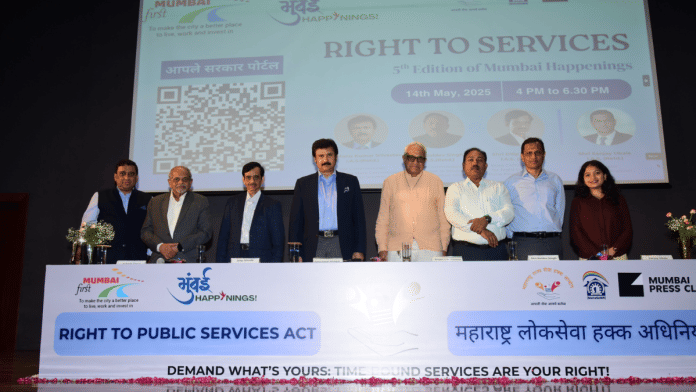Mumbai: The Maharashtra government is launching special initiatives to popularise and expand its Right to Services Act—under which authorities are mandated to provide designated services to citizens in a transparent and timely manner. The provision was rolled out by Devendra Fadnavis during his first stint as chief minister in 2015.
The Fadnavis-led government plans to launch a mobile app for ease of registration for availing of services under the act, and also include chapters on the legislation in Class 9 and 10 textbooks of the state board, officials said.
The government has set a deadline of 31 May for all departments to notify public services—only notified services come under the ambit of the law—under the Right to Services Act. The failure to do so will result in penalties.
“Ten years have passed, but we are still notifying services, which is a cause for concern. However, 1,027 services have been notified under the Act, up from 500 services last year,” said Manu Kumar Srivastava, a retired IAS officer who is now the chief commissioner of Right to Services.
He was speaking at a civic engagement session organised by non-profit Mumbai First at an auditorium in Bandra Kurla Complex on Wednesday.
Srivastava and his colleagues Baldev Singh and Dilip Shinde, both retired IAS officers, explained how to use the Right to Services, and also about the improvements the state government is bringing about in the service.
Singh is the divisional commissioner for the Konkan division for Right to Services, while Shinde is the divisional commissioner for Pune.
Right to Services, officially known as the Maharashtra Right to Public Services Act, came into force on 28 April 2015 to provide transparent, efficient, and timely public services in Maharashtra.
Under the Act, public authorities were mandated to notify outside their offices and on websites public services they provide within three months along with the details of fees, designated officers and appellate authorities.
“The Right to Services is not well-known amongst the public because it came into existence only in 2015, 10 years after the RTI Act was implemented in 2005. The RTPSA aims to reduce compliance burden on citizens by using information technology to provide transparency and accountability in accessing public services, and only applies to notified services in a government gazette. Unless a public service is notified, the Act does not apply to it,” Chief Commissioner Srivastava said.
He also announced the government is planning to introduce a chapter on the RTPSA in 9th and 10th standard school textbooks to raise awareness.
95 percent disposal rate
Over one crore people have registered on the RTS-Aaple Sarkar Portal—the site for gaining access to public services—which currently provides 583 services online. The deadline for integrating the remaining services on the portal is 15 August 2025 as decided by the Maharashtra government, Baldev Singh said.
The portal has achieved a 95 percent disposal rate of applications since the implementation of RTPSA, 2015. As of 13 May 2025, 18,89,98,924 applications were received, of which 17,79,44,747 were disposed.
Under the Act, a citizen can appeal a decision with the first and second appellate authorities up to 30 days after their application has been rejected and no service has been provided. The penalty for non-compliance by a designated officer ranges between Rs 500 and Rs 5,000.
A user-friendly mobile application that provides easy access to citizens for services is currently under development, with features like a payment gateway and a designated workflow of officers.
‘Poor interface, problems with helplines’
During the question and answer segment, audience members raised multiple issues, such as “poor” user interface and design of the website, “non-response” to citizen complaints, problems with helpline numbers, “poor” website servers, and “non-compliance” by appellate authorities.
Dharmesh Jhaveri, a businessman who had applied for revenue services six months ago, said he didn’t receive any response despite repeated appeals for a report in relation to re-measurement of a land survey.

“I tried registering for revenue services on my land parcel last year on the Aaple Sarkar Portal, and paid the required fees. Despite trying multiple times to appeal the non-compliance with appellate authorities and the commissioners, I did not receive any response even after sending screenshots of the problem via mail,” said Jhaveri.
Srivastava then asked Jhaveri if the service he was seeking had been notified, and assured him of looking into the matter if the problem wasn’t resolved.
“The Act only provides for rules of ‘notifying’ service provisions and doesn’t entail any complaint or redressal mechanism. Unlike Bihar, Maharashtra does not have rules for raising complaints with officers who do not comply on time. However, the government of Maharashtra plans to bring in a complaints mechanism soon, in line with Bihar’s policy,” Srivastava said.
He further added that the website sometimes faces server issues, which is why documents do not upload very quickly on the portal, and the mobile application will be launched soon for easy citizen service access in Maharashtra.
Pooja Bhatia is an intern with ThePrint.
(Edited by Ajeet Tiwari)
Also Read: Maharashtra govt to train ITI students in disaster management as India-Pakistan tensions rise






